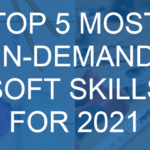Employability skills are the non-technical skills needed to get a job. Here are our top 12 recommendations and related online courses to take your game to the next level!
1. Continuous Learning
If you want to get ahead you need to embrace continuous learning. By improving your skill set, whether it’s soft skills or hard skills, you boost your chances of improving your career trajectory.
Employers love to hear that candidates enjoy learning because it’s necessary in a business world where change and growth are happening at remarkable speed. Those who don’t embrace learning new things will be left behind.
Check out online learning platforms like Udemy & Coursera to see what they have to offer in your professional field.
2. Time Management
Time management has always been important, but with the acceptance of remote work, it’s more important than ever. That means that your employers have to trust that you can manage your time and get your work done without anyone looking over your shoulder. In today’s age of smartphones, social media, and binge-worthy TV, you need to prove that you can stay on task and on target.
Prioritize your tasks for the next day before signing off, putting the biggest, ugliest tasks first if you can. Once you tackle those, the rest will come easy, and you’ll stay on target.
3. Decision Making
Not everyone can make decisions. For some people decision making is excruciating and lead to procrastination not knowing the outcome of their decision.
Having the ability to assess the criteria in front of you and come to a conclusive decision on a regular basis, even if you’re wrong once in a while, marks you as a person who gets things done. It also shows that you’re willing to take risks on occasion — and that’s a good thing, too.
Decision making is more than just an attitude, it is a skill.
4. Collaboration
If you think remote work means flying solo, you’re probably in for a surprise. Collaboration is alive and well, but it takes a little more conscious effort now. Embracing collaboration and thinking about it proactively as you begin projects shows hiring managers that while you may be working alone in your home, you’re still a team player.
Learn cross-functionally; while you may not be able to do everything, learning how and why other teams do what they do will help you work together with them on any project with understanding and patience.
5. Emotional Intelligence
The ability to stay in tune with your own emotions and the emotions of those around you is more valuable than ever and is why it’s an important job skill for 2021 & beyond. The days of “leave your problems at the door when logging in to work” are gone.
From acknowledging your own emotions to having empathy for the emotions of your co-workers and clients, emotional intelligence will help you be a “people person” without having to be an extrovert.
Here is a quiz you can take for Emotional Intelligence.
6. Creativity & Resilience
We have experienced big changes last year and in 2021 which has now become the “new-normal”. This change has also provided the opportunity for growth, and that means having creativity can put you in the driver’s seat for finding solutions and new ideas that move the needle for your company. Resilience goes hand in hand with creativity.
Sometimes new ideas don’t work right away — or at all — and being able to rebound from a setback with improvements and new ideas shows employers that you will keep their company moving forward.
7. Adaptability
Nowadays, things are changing faster than ever? As technology evolves, we’re finding new ways to use it. That means the old “We’ve always done it this way!” attitude is nothing but dead weight on your career.
You need to be adaptable to new technology, new collaborations, and new philosophies to succeed in 2021
& beyond.
8. Change Management
As mentioned in point 7, things are changing faster than ever, and sometimes that can be hard on employees. Having a knack for change management, whether that means handling changes on your own or helping to guide whole teams on new directives, is a great way to make yourself an irreplaceable part of nearly any organization.
9. Coaching Mindset
Success has less to do with how aggressively you try to boost your own career and more with how you help the people around you. From your bosses to your direct reports, having a coaching mindset means you look to make those around you better. Think about it — who doesn’t want to work with (or for) a person like that?
10. Project Management
Understanding the full scope of your projects and being able to manage them from concept to completion is a critical skill. With the emergence of more remote work, it’s harder for management to keep tabs on every project going, so having employees who are skilled at project management makes their lives easier. It also sets you up to help others and possibly move into a management role of your own.
11. Social & Digital Media
Digital media is running the show these days. If you want to compete in the job market, you need to at least be cognizant of what’s out there, how it works, and what kind of audience it enjoys.
While it may be comfortable to stick to what you know and ignore the newcomers, that mindset will leave you out of date.
12. Artificial intelligence
We are living in the age of AI. We not only want computers to do work for us, but we also want them to get smarter as they work. Just like cloud computing, you may not need to be a top-level expert, but a solid understanding of AI can give you a vital edge in a difficult job market.

